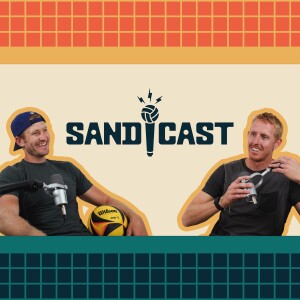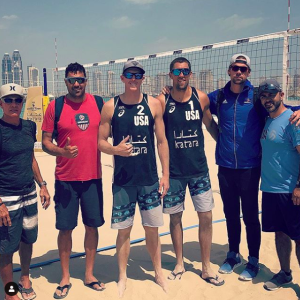
SANDCAST: Beach Volleyball with Tri Bourne and Travis Mewhirter
Sports:Volleyball

State of the Beach Volleyball Union: Recapping Doha, Exciting AVP News, Partner Switches
 2019-03-20
2019-03-20
There is no shortage of ways in which to describe the absurd depth on the World Tour. You can start with the obvious, the upstart Chileans who many might claim to have come out of nowhere but, really, they’ve been here, hiding in plain sight all along.
In 2011, Esteban and Marco Grimalt – cousins, not brothers – played in their first FIVB event. In the time between then and Sydney, a three-star event in early March, they had competed in 59 tournaments. They never switched partners. Nor were they ever really much of a threat at all.
And yet there they were in Sydney, winning six straight matches, including the gold medal, over qualifiers Enrico Rossi and Adrian Carambula.
Though perhaps that should be your measurement of depth – the fact that Rossi and Carambula could march out of the qualifier and straight to the gold medal match. But just when you might think that’s impressive, the Grimalts one-upped them the following week, at a four-star in Doha.
Now, it was their turn to begin in the qualifier, smoking a talented German team in Nils Ehlers and Lars Fluggen, 21-16, 21-13. It didn’t matter that every elimination match in the bracket rounds, save one, the finals, went three. Didn’t matter that they had played six matches the week before.
By the time the finals rolled around, the Grimalts seemed as if they were playing their first match, not their 14th in 11 days, with international travel and time zone switches and all other manner of mental and physical obstacles to throw them off.
“There’s no good draws,” Tri Bourne said on his eponymous podcast, SANDCAST: Beach Volleyball with Tri Bourne and Travis Mewhirter. “How many times do you see a qualifier team win it?”
It happens, though it’s rare. Bourne and John Hyden did it in Berlin of 2014. Poland’s Piotr Kantor and Bartosz Losiak did it in Rio de Janeiro in 2016. Same goes for Alvaro Filho and Saymon Barbosa at the Fort Lauderdale Major in 2017.
The difference with those teams, however, is that they were all new. The Chileans have been around for nearly a decade, and now, suddenly, they’re winning back-to-back tournaments, the second of which out of the qualifier.
“It’s so gnarly,” Bourne said. “I was just talking to my agent about it and he was asking about, saying ‘Oh, seventeenth doesn’t sound very good for us, does it?’ And I was like, ‘Honestly, when any given team can win on any given week? It’s not like the top ten teams in the world are never taking seventeenths. The World Tour is just constantly getting mixed up.’”
Perhaps the best measurement of depth, then, is to look at the bottom, not the top. At the gold medalists and world champs who, having already proven they are the best in the world at what they do, either barely cracked pool or didn’t even make it to pool play in the first place.
A week after playing in the finals, Rossi and Carambula failed to qualify. Fellow Italians Alex Ranghieri and Marco Caminati fell to the same fate. Filho and Ricardo Santos, the most decorated blocker in beach history, didn’t make it past pool.
Joining Bourne and Trevor Crabb in seventeenth were 2016 Olympic gold medalist Bruno Oscar Schmidt and 2017 World Champ Evandro Goncalves. Alongside them were former world No. 1 Alex Brouwer and Robert Meeuwsen. Bruno’s partner in those 2016 Olympics, Alison Cerutti? Another seventeenth, alongside Andre Loyola, one of the most promising talents in Brazil.
Such is the state of the world tour.
"I'm obviously not happy with our finish," Bourne said. "But I'm super happy with our team."
More Episodes
 2023-07-19
2023-07-19
 3.3k
3.3k
 2023-07-17
2023-07-17
 2.0k
2.0k
 2023-07-11
2023-07-11
 2.1k
2.1k
 2023-07-05
2023-07-05
 2.8k
2.8k
 2023-06-21
2023-06-21
 3.6k
3.6k
 2023-06-20
2023-06-20
 2.1k
2.1k
 2023-06-06
2023-06-06
 2.2k
2.2k
Create your
podcast in
minutes
- Full-featured podcast site
- Unlimited storage and bandwidth
- Comprehensive podcast stats
- Distribute to Apple Podcasts, Spotify, and more
- Make money with your podcast
It is Free
- Privacy Policy
- Cookie Policy
- Terms of Use
- Consent Preferences
- Copyright © 2015-2024 Podbean.com


